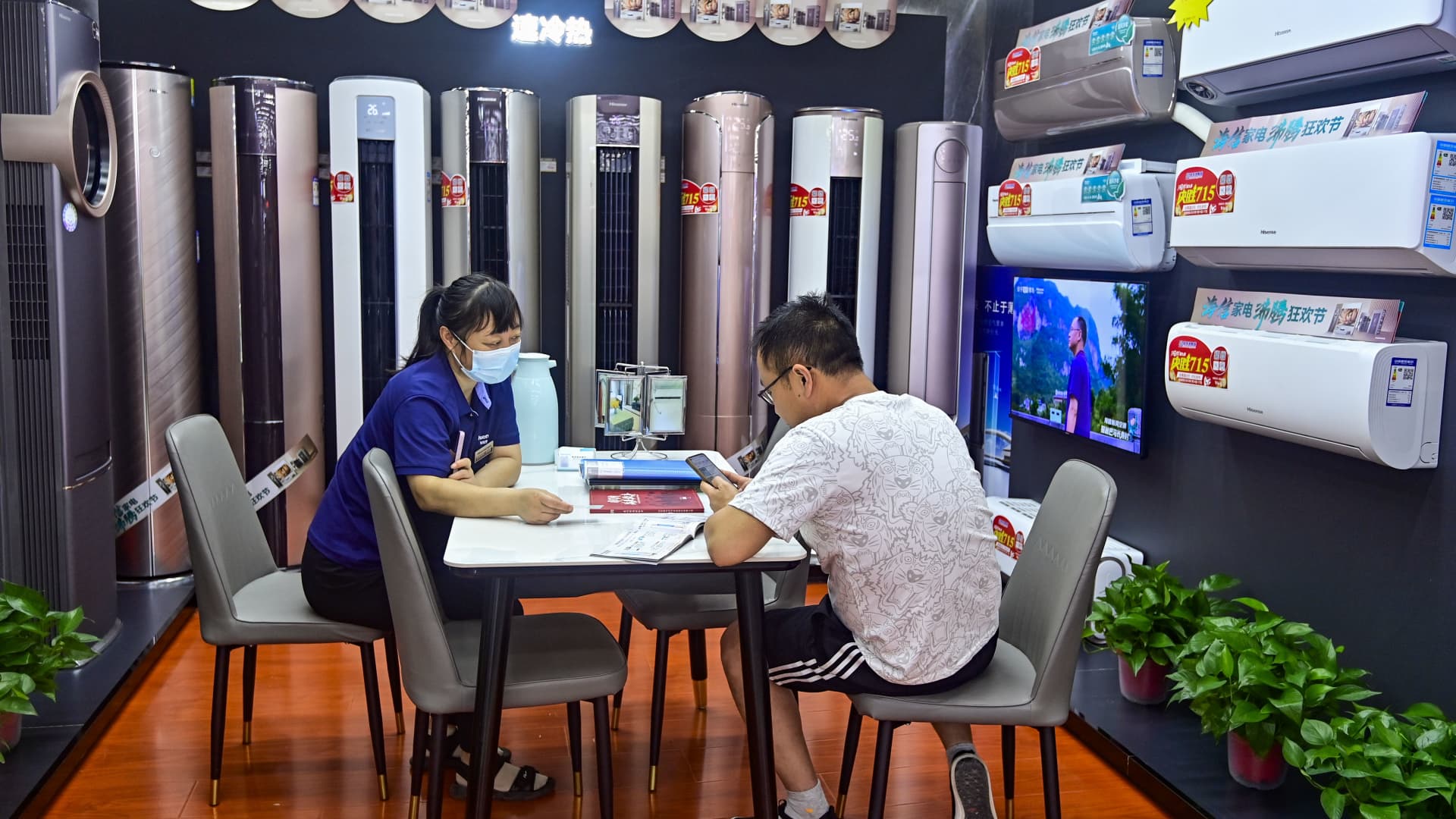While big questions swirl about China’s macro policy, some sectors are seeing fundamentals shift in their favor. Profits are moving to industrials, consumer discretionary and staples — and away from materials and energy, according to HSBC. That’s based on the firm’s analysis of the roughly 1,700 mainland China-listed companies that have released earnings previews for the first half of the year. A reason for the shift in profits, the report said, is falling producer prices and their widening gap with consumer prices in China. That means upstream businesses are making less money, while costs drop for mid- and downstream companies. Breaking that down further, the HSBC analysts looked for sub-sectors with low inventory levels and strong demand momentum. Their screen found that home appliances, media and software sectors were among those that fit the bill. The Producer Price Index has fallen for nine months straight. The Consumer Price Index slowed to 0% in June. That’s spurred worries of deflation in China and broader sluggishness in the world’s second-largest economy. But the worst may soon be over. The big event of the next seven days is an expected gathering of Chinese leaders, called the Politburo. “Everyone is looking forward to the [meeting] at the end of July,” said Ding Wenjie, investment strategist for global capital investment at China Asset Management Co. That’s according to a CNBC translation of her Mandarin-language remarks. She pointed out that in addition to decisions made at the meeting itself, other policy details may come out after it ends. There’s no announced date, but last year in July the Politburo met on the last Thursday of the month. Beijing in the last two weeks has started to signal more economic support. A lengthy government document and subsequent press briefing on Thursday talked up the importance of helping the private, non-state-owned sector. Markets are still waiting for action. Confidence has been bruised by regulatory tightening that suspended Ant Group’s IPO days before its listing, and forced Didi to suspend new user registrations days after its U.S. IPO. A big indicator to watch is whether internet platform companies can list their subsidiaries in public markets, Ding said. Ant’s affiliate Alibaba in March said it would split into six business units , each of which could then raise funds in an initial public offering. JD.com is also planning IPOs of its industrial and property units. Meanwhile, regulators have signaled closure by allowing Didi to resume new user registrations, and finally in July issuing a fine on Ant. Policymakers otherwise have little room to act given high debt levels in the economy, Ding said. She expects that overseas markets will be an area of profit growth for Chinese companies, while the domestic recovery just needs slightly more time. China has only reopened for six months, she said, noting that consumption can improve as the economy grows. Already, the summer has seen a surge in domestic travel. Goldman Sachs analysts said Friday that implied oil demand from scheduled domestic flights in July is expected to be above the 2019 level. Earnings winners Looking ahead, UBS Securities China Equity Strategist Lei Meng assumes “moderate but no aggressive policy stimulus,” and likes sectors such as appliances, food and beverage, computer software and insurance. Meng expects that the first quarter was the low point for earnings this year, with gradual improvement the rest of the year, for 10% earnings per share growth in the A-share CSI300 index for the full year. The CSI 300, which includes Shanghai and Shenzhen-listed companies, is down slightly for the year so far, while the Shanghai composite is clinging to gains. When it comes to individual stocks, HSBC looked for names where their estimates were most above the consensus. “We continue to believe fundamentals (like earnings and valuations) will come back into focus and that stocks whose results beat consensus estimates can benefit,” Steven Sun, head of research at HSBC Qianhai Securities, and a team said in a July 19 report. Top on the list is software company 360 Security, which HSBC’s earnings estimate for the year is double the consensus. Baosight, another software company, also made the top 10, as did home appliance company Sanhua. All three stocks are up double-digits for the year so far. But not all software stocks made the cut. Well-known tech company iFlytek made HSBC’s list of 10 stocks where the analysts’ estimates are well below that of the consensus — implying a miss. All four stocks are listed in mainland China. The HSBC study only looked at names with a market cap greater than $10 billion and a three-month average daily trading volume of more than $10 million.
China’s earnings season is just getting started. Winners to watch

Denial of responsibility! Chronicles Live is an automatic aggregator of the all world’s media. In each content, the hyperlink to the primary source is specified. All trademarks belong to their rightful owners, all materials to their authors. If you are the owner of the content and do not want us to publish your materials, please contact us by email – chronicleslive.com. The content will be deleted within 24 hours.
